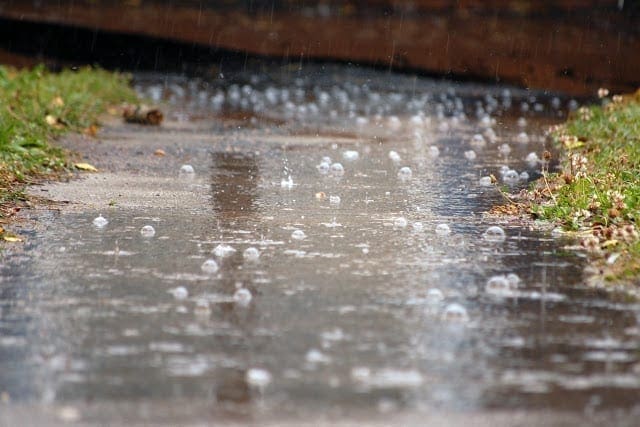
 |
| earthy smells of rainy feel crown my head in coming rain |
At 2 p.m. this afternoon, it rained after a long stretch of rather hot and dry days. That lovely after-the-rain-smell filled the air, and I inhaled lung-fulls of it. That wonderful scent is very often listed among people’s favourite smells, along with other smells like that of freshly cut grass, coffee, or citrus fruits. It’s been described variously as the ’smell of rain’, ‘the smell of wet earth’, and so on, but as far as indicating the exact origin goes, these descriptions are all somewhat inaccurate.
Olfaction is a very complex process, not yet fully understood. In order for us to be able to smell an object, molecules given off by that object must reach the olfactory receptor neurons in our nasal passage. The neurons have different types of receptor proteins, and each type fit only certain kinds of molecules. Once the molecules bind to the protein receptor sites of the neurons, the neurons send electrical impulses to the brain.
Depending on the overall impulse received, the brain figures out what it is you’re smelling, and that’s when you say, “Aha! Coffee!” (Speaking of which, there are over eight hundred aromatic compounds so far found in coffee. How exactly these 800 compounds interact with the olfactory system to produce several varied smells (some of which are too subtle for the lay person to detect, and can only be discerned by the coffee connoisseur) is something not clearly known.)
There are about 16 million smells that the human nose is capable of detecting. However, it’s unlikely that anybody can really perceive all of them, and most of us can only detect a very small percentage of that number. There exists a strong relationship between olfaction and genes.
Apparently, of the 1000 genes that control odor reception in mammals, only around 345 are functional in humans (this number can vary between ethnic groups and individuals), so the remaining majority just have nonsense mutations and are defunct. This genetic basis of smell has also been demonstrated in some people – the inability to smell camphor is an inherited trait.
Some individuals may completely lack the sense of smell right from birth, and such a condition is called congenital anosmia. Note that anosmia might also be caused later in life, but due to other factors, such as brain damage or the death of olfactory receptors.
Coming back to what this post was originally about: the smell of rain is mainly to do with the a plant-based oil, called petrichor. This oil is exuded by plants during dry spells, and after rains, it diffuses into the air. The complex compound has so far not been synthetically produced (its exact structure is not known, and it’s believed to have over 50 distinct components), but perfumes that exude this scent have been manufactured by collecting and concentrating petrichor.
Another compound that contributes to that after-rain smell, lending it its earthy note is geosmin, or if you want the easier term: 4,8a-dimethyl-decahydronaphthalen-4a-ol. This is a substance produced by Actinobacteria, a very large phylum of uhm, well, bacteria. Under dry conditions, the bacteria produce spores, which are liberated into the air when it rains. We inhale millions of them (they’re perfectly harmless), thus detecting their odor.
Interestingly, both these substances are present in high concentrations only after a dry spell, which is how come the first rains of the season produce such a strong smell, and later showers don’t generate the odor so sharply. However, the human nose is extremely sensitive to the smell of geosmin, able to detect it even at one particle per hundred billion, so we may still perceive the smell faintly.




Be the first to comment